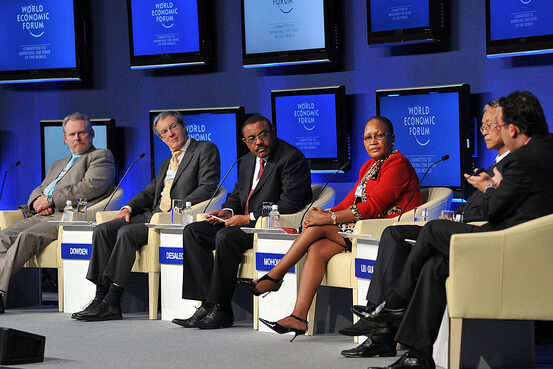
CAPE TOWNSOUTH AFRICA, 06MAY11 - The Panel during the Future of China-Africa Relations session held at World Economic Forum on Africa 2011 held in Cape Town, South Africa, 4-6 May 2011. Copyright (cc-by-sa) © World Economic Forum (www.weforum.org/Photo Eric Miller emiller@iafrica.com
Ed: Concerns have been expressed (e.g. by Hillary Clinton and David Cameron) about the detrimental role China may play in African media sectors, by increasing authoritarianism and undermining Western efforts to promote openness and freedom of expression. Are these concerns fair? Iginio: China’s initiatives in the communication sector abroad are burdened by the negative record of its domestic media. For the Chinese authorities this is a challenge that does not have an easy solution as they can’t really use their international broadcasters to tell a different story about Chinese media and Chinese engagement with foreign media, because they won’t be trusted. As the linguist George Lakoff has explained, if someone is told “Don’t think of an elephant!” he will likely start “summoning the bulkiness, the grayness, the trunkiness of an elephant”. That is to say, “when we negate a frame, we evoke a frame.” Saying that “Chinese interventions are not increasing authoritarianism” won’t help much. The only path China can undertake is to develop projects and use its media in ways that fall outside the realm of what is expected, creating new associations between China and the media, rather than trying to redress existing ones. In part this is already happening. For example, CCTV Africa, the new initiative of state-owned China’s Central Television (CCTV) and China’s flagship effort to win African hearts and minds, has developed a strategy aimed not at directly offering an alternative image of China, but at advancing new ways of looking at Africa, offering unprecedented resources to African journalists to report from the continent and tapping into the narrative of a “rising Africa,” as a continent of opportunities rather than of hunger, wars and underdevelopment. Ed: Ideology has disappeared from the language of China-Africa cooperation, largely replaced by admissions of China’s interest in Africa’s resources and untapped potential. Does politics (e.g. China wanting to increase its international support and influence) nevertheless still inform the relationship? China’s…
